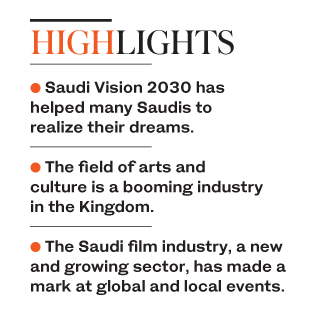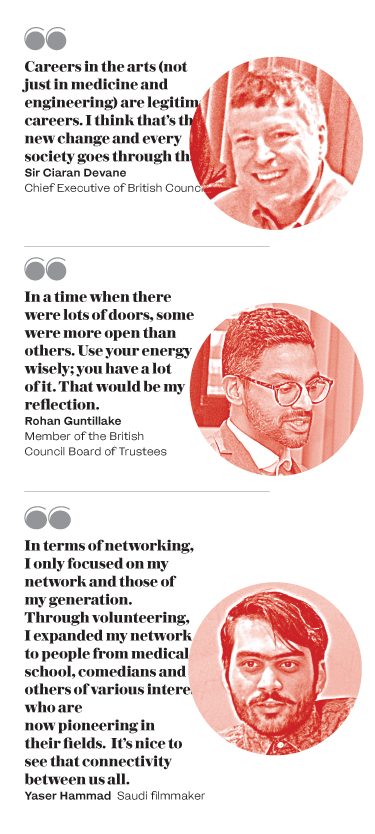JEDDAH: Saudi youths are tearing down barriers in the field of arts and culture. Thanks to Saudi Vision 2030, no Saudi has to walk a predestined path. Many are realizing their dreams and have become creative artists, illustrators, storytellers, actors and filmmakers.
Arab News hosted a roundtable discussion on Monday with members of the British Council, headed by Sir Ciaran Devane, and Rohan Gunatillake, a member of the board of trustees along with a selection of Saudi youth representing fields ranging from education to culture and art. It was moderated by Rawan Radwan, Arab News’ regional correspondent.
The topics included defining creative economies and the role of cultural relations within them; creative education — why a creative curriculum matters; digital skills in the cultural sector; and routes to employment in the field of arts and culture.
Devane, the chief executive of the British Council, opened the discussion by speaking about the council’s main goals and its contribution to help support the creative sector in Saudi Arabia, mainly through arts and culture exchanges.
He explained that learning about other cultures and building a friendly basis for knowledge and understanding is important.
“It’s about the interchange of knowledge, arts, culture, values and beliefs, and the reason for doing so is to create a basis of creative knowledge and understanding between people. It is part of making a peaceful world,” he said.
As the Kingdom is undergoing a cultural progression, Devane said that the British Council is keen to support arts and culture in Saudi Arabia, based on the UK’s experience. “From the UK point of view, we have experience in the creative industries and we have a lot to share,” he said.
“We’ve learned a lot of things, we’ve made mistakes along the way and we did a lot of things right. As the Kingdom starts to think on how to expand their own culture and expand the entrepreneurship, we feel very strongly that we have a contribution to make and it comes in the form of the interchange where people can learn as well now, at a time when it could be most helpful to the next generation of young people in the Kingdom.”
The discussion revealed how Saudi Arabia is expanding the role of culture and how youth is the driving force behind the change and exchange of cultures. Starting from the ground up, members of the roundtable spoke of the challenges and the positive results Saudi Vision 2030 is providing across the nation.
One initiative created by Saudi youth, KSA in All Languages, is the perfect example of building cultural bridges with other countries. It features volunteer translators who speak languages such as Turkish, Korean, Russian, Spanish, French, German, English, Persian, Arabic and Japanese.
Alreem Al-Mutlaq, a Saudi 23-year-old media director of “KSA in All Languages” who provides Korean language translations for the project, explained that the initiative aims to tackle misconceptions about Saudi Arabia.
“In a globalized world that is affected by misconceptions negatively, we are trying to bridge the gaps between Saudi Arabia and other countries by speaking their language and sharing our historical and cultural traditions by engaging with them in their language, and celebrating our present-day achievements with them,” she said. She added that the initiative is a tool to bring different cultures together.
“What we’re doing is extremely important because, realistically speaking, the world has misconceptions about Saudi Arabia, and we are using social media to build not only bridges, but also friendships, and a global family that respects differences and values them,” she said.
Nada Radwan, a 31-year-old Saudi art director from the entertainment production and distribution company Telfaz11, said that entertainment builds bridges between cultures.
“Entertainment, if done conscientiously, could be the tool used to dismiss preconceived notions, correct misconceptions and break down stereotypes,” she said. “Real stories told from a genuine perspectives would depict what makes our cultures unique but highlight our shared humanity and bring us to a better understanding of one another.”
Telfaz11 is considered the GCC’s leading Arabic multi-channel online network. It was established in 2011 and has more than 12 million followers on social media and more than 1 billion views on YouTube.
Attendees were motivated and encouraged to share their thoughts and ideas about how arts, culture and education is progressing in Saudi Arabia.
Yaser Hammad, a 25-year-old Saudi filmmaker, said that the Kingdom’s Vision 2030 has helped him to pursue his ambitions. “The vision has helped me unify my dreams and aspirations with many other Saudi creatives, and each of us are working on our own things, which only expands these dreams and make them more achievable,” he said.
Sarah Taibah, a 29-year-old Saudi artist and actress, said that she is overjoyed to be part of the growing movement in the field of the arts.
“I’m excited to be part of this modern Saudi Arabia, and grateful to see the change that is happening right now where the arts are being celebrated,” she said.
Rana Garout, a 24-year-old Saudi medical student, explained that the discussion provided her with a platform to speak up and participate.
“I wanted to challenge myself in being a part of something that feels like it’s bigger than me,” she said. “I wanted to take another step toward my dream, which is to be a spiritual motivational speaker, and for that I need to be comfortable talking in front of people. Yesterday I felt my confidence increased a bit as Arab News served me with the right platform to be more comfortable participating.”





































